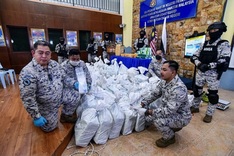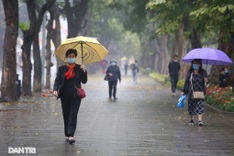Under the draft decree, students in border communes may receive VND 450,000 (approximately USD 17.70) and 8 kilogrammes of rice per month for up to nine months each school year.
First-grade ethnic minority students who studied Vietnamese before entering grade 1 are entitled to one additional month of support.

Students of Quang Nguyen Semi-boarding Ethnic Minority School at the opening ceremony of the new academic year on September 5.
Around 417,708 students in border communes are expected to benefit from this proposal this school year. The figure represents the estimated number of primary and lower secondary students in these communes after recent administrative mergers.
The lunch support programme for primary and lower secondary students in border communes is projected to cost about VND 2 trillion and over 30,000 tonnes of rice each year.
The people’s committees of localities will direct and guide the implementation of the policy, including instructions on how to use the allocated funds for student meals in line with local conditions and beneficiaries.
Local authorities are responsible for monitoring the policy’s implementation, promptly uncovering and strictly sanctioning any organisations or individuals who reduce students’ meal entitlements or violate the law during its execution.
According to a government decree, only children, preschoolers and students in ethnic minority and mountainous areas, as well as in specially disadvantaged coastal, alluvial, and island communes, who attend semi-boarding schools because they cannot return home during the day, are eligible for lunch support.
Specifically, preschool children receive VND 360,000 per month for lunch, while each student or trainee is granted VND 936,000 per month for meals. Semi-boarding students and trainees are also eligible for housing support of VND 360,000 per month, along with 15 kilogrammes of rice.
The majority of other primary and lower secondary students in border communes have not yet benefited from lunch support.




















